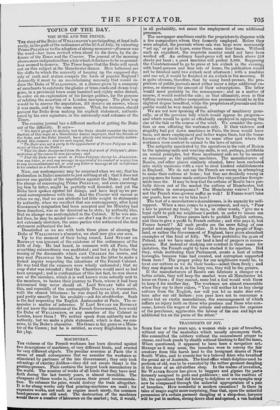TRANSPORTS OF JOY.
SOME four or five years ago, a woman stole a pair of breeches,' without any of the modesties which usually accompany theft. She committed the robbery without the concealment proper to shame, and took goods by stealth without blushing to find the fame. When questioned, it appeared to have been a navigation act. Strange as it may seem, the breeches were to convey the fair creature from this harsh land to the benignant shores of New- South Wales, and to reunite her to a beloved felon who breathed the genial air of Australia. The kind office which dolphins used to perform of old, was to be executed by the netherent dangling at the door of an old-clothes shop. In the realiannsnof invention, Sir WALTER SCOTT has given to beggars and gipsies the parts formerly assigned to gods and goddesses ; and in the realities of life, the operations that did belong to dolphins or sea-nymphs may now be compassed through the unlawful appropriation of a pair of breeches. How wonderful is modern causation ! Is there in tales of magic aught more surprising, than that, upon the unlawful possession of a certain garment- dangling at a shop-door, lawyers will be put in motion, strong doors shut and opened, a van hurried down to the sea-side, and a ship put under sail for another hemi- sphere? Our Lady of the Breeches fully explained the intention and amatory character of her theft. Separated from the felon of her heart by transportation, and without money to pay for a passage out, it had struck her that a robbery was the only means of link- ing them together again in the joint. fetters of law and love ; and she accordingly had seized the inexpressibles for that inexpressible joy. Why she made choice of the particular article, did not appear ; but it might be that she desired to carry out in the means of her union the emblem of her matrimonial supremacy. But as Horatio says, to examine thus were to examine too curiously. It was probably this story which suggested to Mrs. T. SHERIDAN the fable of her beautiful tale Carwell ; the heroine in which, by soaring above the breeches to the passing of forged notes, by pre- ferring utterance to inexpressibles, brings her neck within the compass of a halter, and goes off from the Old Bailey dock to eternity, instead of sailing from Sheerness dock to Botany Bay, and rejoining, as her fond soul desired, her beloved husband — condemned, disgraced, felon and convict, but still the jewel of her heart—her poor all, her sun of hope, her world of comfort. There are no circumstances that can degrade this entire devotion of one to one ; and even as the worth of the object is abated, the triumph of the affections, which know only to love, is enhanced. Carwell is therefore a beautiful story, and our fact of the lady and the smallclothes an authentic tale of the heart ; but yet these things are not without their danger in suggestion.
In a newspaper before us, we see that, without a particle of sentiment to season his felony, an unworthy man has put himself in harness for Botany Bay.
"A man named Burton was charged with going into a stable, and stealing a set of harness. The case, as far as regarded the identity of the prisoner, was clearly proved ; and when asked whether he wished to say any thing on the subject, he made a voluntary confession of the robbery, adding, that he committed it for the sole purpose of getting tried, convicted, and transported to Botany Bay. He had heard of the comforts attending the life of a convict abroad; and ever since he had an itching to get a pas- sage free, and could not accomplish this end without committing some offence against the laws of his country. He had therefore made up his mind to commit a robbery ; and the complainant's stable being open, he went in and stole the harness, and afterwards endeavoured to dispose of it to a person in the neighbourhood, whom he was anxious should discover that he was a thief, and have him taken into custody."
The fellow will probably be disappointed; for the law refuses the bounty of transportation to small offences. Yet it would be curious to make a catalogue of the causes that have freighted a ship for New South Wales. How would the stolen articles look in comparison with the machinery they have set in motion ? A rope's end employed in a whipping would, in many cases, be better, and by some hundreds of pounds cheaper, than the tackle-finding, fitting, manning, and victualling of a vessel for a distant voyage.



























 Previous page
Previous page